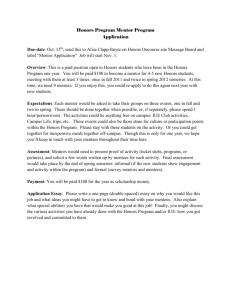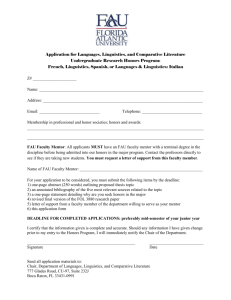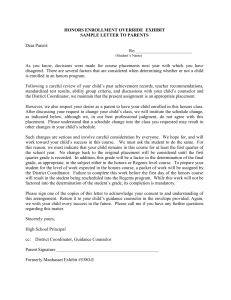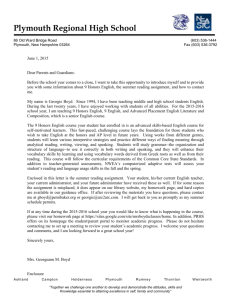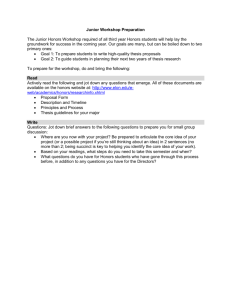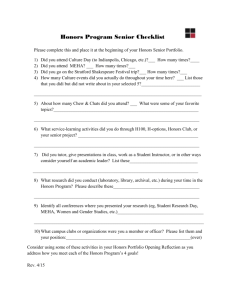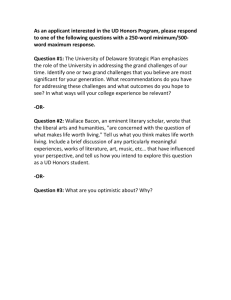Handbook junior year fieldwork, senior honors project
advertisement
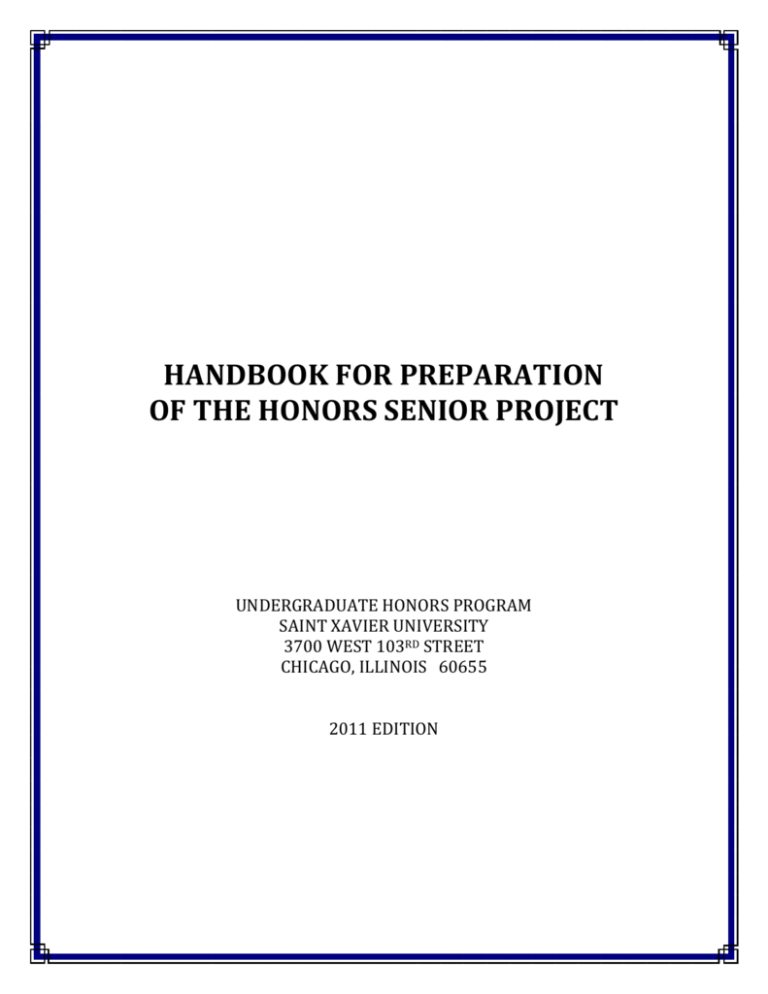
HANDBOOK FOR PREPARATION OF THE HONORS SENIOR PROJECT UNDERGRADUATE HONORS PROGRAM SAINT XAVIER UNIVERSITY 3700 WEST 103RD STREET CHICAGO, ILLINOIS 60655 2011 EDITION CONTENTS Page 2 INTRODUCTION SECTION I Rational and Expectations for the Senior Project The Senior Project Mentor The Senior Project Proposal Developing and Completing the Project Presenting the Project Coordinating the Project with Projects in the Major Credit Hours General Guidelines for the Manuscript Expenses Timetable Miscellaneous Information and Reminders 3 5 6 6 7 8 8 9 10 10 11 SECTION II: FOR FACULTY MENTOR General Overview of Mentor’s Role Specific Responsibilities of the Mentor Compensation and Other Rewards Tips for Honors Project Mentors 12 12 14 15 SECTION III: APPENDIX Senior Honors Project Proposal Form Sample Proposals Mid-Year Progress Report Format Sample Mid-Year Progress Reports Sample Abstracts Sample Title Page Approval Page Planning Sheet Honors Senior Project Topics, Class of 2003-2012 1 A-1 A-2 A-3 A-4 A-5 A-6 A-7 A-8 A-9 INTRODUCTION This handbook provides Honors students with specific guidelines and procedures for their senior research/creative projects, and also provides advice to help them avoid some of the common hazards and pitfalls involved in completing a project of this scope. We welcome the suggestions of Honors students and faculty project mentors for making this handbook more useful. We welcome any other advice or recommendations about the senior project process that should be included to aid future Honors students and faculty engaged in this exciting stage of the program. The handbook is primarily for the student’s use, but it also contains information of particular interest to faculty and one section addressed specifically to faculty mentors. Each student and faculty mentor should therefore read the handbook with care, taking specific note of his/her part in the process. The handbook is divided into two sections, followed by an appendix. The first section articulates guidelines, expectations and stages of the senior project process. It begins with two letters from the Honors program director: one written to students explaining reasons for doing a Senior Project, and another addressed to both students and their mentors describing expectations for the project in terms of length and quality. Section One then provides specific guidelines for selecting an advisor, writing a proposal, and working in HONOR 352/53 and with the faculty mentor to develop, revise, complete and present the final product. We have tried to use specific examples to clarify some of the problems students commonly encounter, and (at the risk of sounding preachy) have added cautionary notes throughout. The second section is addressed primarily to faculty mentors, describing their role, responsibilities, potential rewards and frustrations, what they should expect of the students they advise, and their compensation. Finally, the appendix contains various key documents for the senior project process: model proposal forms, a sample title page, approval page, contents page, abstract, and progress report. Samples of completed senior projects are archived in the Honors Program Room; Honors students are encouraged to browse through them. If after reading this handbook, the student or faculty advisor still has questions concerning the senior project process, please contact the director of the Honors Program, Dr. Judith Hiltner. 2 SECTION I RATIONALE AND EXPECTATIONS FOR THE HONORS SENIOR PROJECT A Letter from the Honors Program Director to Honors Student and Mentors The designers of the Saint Xavier University Honors Program anticipate that the senior Honors Projects will be a source of growth and pride for students and faculty involved. We hope that students will present their projects at state and national professional meetings and that the process will better prepare students for the challenges of graduate or professional schools and for the demands of their future careers. The Honors Program hopes to establish a tradition of high quality in the research and creative work of its graduates. TO THE STUDENT: Why do a senior project? The project is both an opportunity and a challenge. Certainly the completion of this work looks good on a resume and provides an apprenticeship in professional knowledge and skills that will have its pragmatic benefits later. But the work is important and worthy first of all for the intellectual and creative process in which it engages you personally. Choosing a topic to which your curiosity and ambition have led you, working closely with a professional expert, doing sustained work of significant scope and substance, learning more about your subject, but also about your own capabilities—all make this experience unusual and rewarding. To ensure that this work is the best it can be, we hold out high expectations, support you along the way, and celebrate your results. But the main responsibility is obviously on you. The more serious your effort, the greater your satisfaction will be. TO THE STUDENT AND THE MENTOR: How good does this project have to be? The Honors student undertaking the senior project is aiming for an Honors Diploma upon graduation, a distinguished academic award. Thus the student’s work should be conceived, executed and measured according to the faculty’s strongest standards for assessing academic work. A student must earn an “A” or a “B” for the work in order to graduate with Honors. The student should bring her or his own highest standards for performance to bear on the project as well. The growth experience during the project may open to the student new possibilities of achievement undreamed of previously. It may be important, therefore, to keep revising ambitions and standards upwards. Aside from the quality of research and creative work that goes into the project, the finished product should represent high quality in terms of organization, writing, and format. The projects may serve as models for future students and should not contain mechanical errors or present a shoddy appearance. Outstanding projects will be catalogued and archived in the Saint Xavier University Library. The work should be something of which both student and mentor can be intensely proud. 3 .How fresh and “state of the art” should the project be? Mentors in some disciplines, especially where the student is working on a highly specialized or focused topic, may insist that students know the salient literature of the field and contribute something new to it. But in most cases, faculty mentors will permit topics that are not completely new, acknowledging that the chief value of the project lies in the expansion of the student’s frontier rather than the frontier of collective human knowledge. In all cases, however, the student should make effective use of previous scholarship in the area of the project. How “creative” should a creative project be? The project can take whatever form suits the subject. It can be a “traditional” research paper in the humanities or social sciences, the results of lab experimentation as would appear in scientific publications, the products of applied research in professional disciplines, or a creative composition (poetry, short stories, novel, play, film/video/photography/graphics, painting, sculpture or other artwork, a performance, recital, etc.) Projects in the fine arts require originality but also provide further apprenticeship in skills. Students proposing a creative project in Art or Music should be majoring in those disciplines. Students proposing a senior project in creative writing or film also should have completed coursework in these areas and should prepare a portfolio of their work in order for the prospective mentor to ensure that the student is qualified by talent and training to undertake and execute the project. The project itself should be of sufficient challenge and worth to merit the Honors credit to be given, and progress on the project will be monitored in the same way as for a standard academic project. How long and complex should the project be? The answer depends on the discipline. Students are being awarded six credit hours (which may include both hours in the discipline and Honors Senior Project hours) for the project, and these six hours are spread over two semesters. This is roughly equivalent to one fifth of their senior year’s work. In all cases, students should expect to submit a written paper. Students working on research projects culminating in a paper should anticipate submitting an Honors thesis of 30-50 pages. Students working on senior projects with an applied component will be writing shorter papers to accompany their primary product--a portfolio, website, power point presentation, etc. Students working on creative senior projects must also produce a written component to accompany their creative projects—exhibits, recitals, videos, novellas, short stories, poetry, film scripts, etc. Papers to support applied or creative projects will typically run 15-20 pages and include a description of the project itself; an explanation or narrative of the process involved in developing the project, including key choices among competing alternatives, pitfalls, and problemsolving strategies ; the objectives or goals for the project; its significance; a critical assessment of the outcome from either a subjective point of view or a disciplinary perspective. The appropriate length should be determined in consultation with the senior project coordinator. 4 THE SENIOR PROJECT MENTOR In the course of their junior year, as part of the requirement for their Fieldwork Seminar (Honor 350/51), students will do preliminary reading, thinking and research in a topic that interests them, in order to formulate their Senior Project Proposal, and they will select an appropriate Senior Project Mentor. Unless the Honors Program Director approves of an exception, all projects must be formally mentored by a full time member of the Saint Xavier University Faculty who teaches in a discipline directly related to the topic of the project. Co-mentors are permitted where appropriate. A student with a history major, for instance, may want to examine literary responses to a particular historical period, crisis or transition. In such a case the student could have a primary mentor from History and a co-mentor from English. The mentor should be a person knowledgeable about the area the student wishes to explore and, in the best case scenario, one who has had the student in class, and with whom the student has a good working relationship. A student may know the general topic he or she wishes to explore and will search for a mentor who is an expert on that topic. Or, a student may wish to work with a particular mentor, whatever the topic, and will ask that person for guidance in selecting a specific topic. Some faculty members may be unwilling to direct a project for a student whom they have not had in class. The faculty mentor will help the student develop the Senior Project Proposal during the junior year, and must approve the proposal for it to be accepted by the Honors Program Director. Students will present their approved proposals in their Honors Fieldwork Seminar (Honor 351) during the final weeks of the spring semester of their junior year. CAUTIONARY NOTE: Students must stay in close contact with the project mentor during the research and writing process. No more than two weeks should pass without contact between a student and mentor—in person or by phone or e-mail— regarding progress on the thesis/project. Even if students have nothing to “show” the mentor as far as written work is concerned, they should at least tell the mentor what they are reading, what kinds of problems they are encountering, etc. The mentor is not a person who comments occasionally and signs off on a finished project, but a person who truly advises and directs the student’s work. That person can provide the student with valuable resources, can sometimes lend books, can serve as a sounding board for ideas, can challenge the student in numerous ways, and can comment on subject matter, research methods, writing style, organization, and any other aspect of the project. Students must understand that the faculty mentor is responsible for evaluating the final product and must sign off on it by completing a written evaluation, assigning a letter grade, and by actually signing the approval page on the project itself. Students who have not stayed in touch with the mentor throughout the various stages of the project should not be surprised if the mentor is reluctant to approve the resulting project. 5 THE SENIOR PROJECT PROPOSAL The senior project proposal is the formal document which sets forth succinctly (usually no longer than 2-3 pages) the parameters of the intended project. Care should be given to both its content and appearance. The proposal should be carefully proof read (no sentence faults or misspelled words). It should clearly articulate the purpose, anticipated scope and methods to be employed in completing the project. It should reflect a carefully thought out approach to the subject with sufficient elaboration to enable the student’s project mentor and the Honors Senior Project Coordinator to know just what it is the student intends to do. It should demonstrate the student’s familiarity with the research or creative project design conventions of the discipline in which the student is working. The student’s mentor and guest faculty speakers in the junior year Fieldwork Seminar (Honor 350-51) will offer guidance in senior project proposal design. The Faculty Mentor and the Honors Program Director must sign the proposal to for it to be formally approved. See the Appendix to this handbook for sample senior project proposals. Senior Project proposal forms are available in the Honors Program Room and also in the office of the Honors Program Director. Samples of completed senior projects will be archived in the Honors Program Room and available for students to examine as models. Those projects which receive the “Outstanding Senior Project” award at the annual Honors Conference are catalogued and archived in the Saint Xavier University Library. DEVELOPING AND COMPLETING THE PROJECT: HONOR 352/53 During the fall and spring semesters of their senior year, all Honors students enroll in Honor 352/353 (Honors Senior Project Seminar) for 1-3 credit hours (see section on Credit Hours below). This course, taught by the Honors Senior Project Coordinator, is designed to guide students through the process of researching, writing, revising and presenting their senior projects. The class meets periodically to monitor student progress, and to provide the forum in which students critique and make suggestions regarding each other’s work. Throughout the course, students share frustrations and breakthroughs; benefit from peer support in revising, editing and proofreading their work; learn how to draft the abstract required with the final project; and prepare to present their projects at the Senior Honors Conference and to serve as respondent for another student’s project. Students will also be expected to meet on an individual basis with the Senior Project Coordinator. Specific course requirements will be described in the course syllabus distributed at the start of each semester. Throughout the senior year, the student continues to meet regularly with her/his project mentor for individual supervision regarding the content and development of the project. The course is NOT designed to supply substantive direction for each student’s specific project. Rather, it is designed to enable and facilitate their smooth and successful progression through the process. At the end of the fall semester, each student presents a Mid Year Progress Report (see Progress Report Form in the Appendix) to their Honor 352 class. The report summarizes work accomplished so far, any changes in direction the project has taken since the original proposal was drafted and reasons for the changes, obstacles confronted and how 6 the student is attempting to surmount them. Students also outline their plans for completing the project by the deadline the following spring. The student’s mentor should be present for the class report, and should sign the copy of it that is turned into the Honors Senior Project Coordinator following the in class presentation. Students are asked to turn in with the Progress Report an annotated bibliography that lists six to ten sources that the they have found most relevant and useful. They write a note for each source summarizing it briefly and explaining how it is related to what they are doing. (This requirement may be modified – but not eliminated- for students engaging in creative or laboratory research projects.) Any student whose Mid Year Progress Report indicates insufficient progress will be discouraged from enrolling in Honor 353 and from continuing the project. By “insufficient progress” we mean that the mentor and senior project coordinator do not believe that the student has progressed far enough in the project reasonably to anticipate its earning an A or B by the spring deadline for final drafts. The grade for the Honor 352 course is based on the extent and quality of the student’s progress on the senior project and on the student’s attendance and participation in the class meetings. The Mid Year Progress Reports and advice from faculty mentors will contribute to this assessment. The grade will be assigned by the Senior Project Coordinator. During the spring semester, students in Honor 353 complete their projects, draft their abstracts, share drafts with peers for critique and suggestions, revise their drafts and produce the finished product. They prepare to present the results of their projects at the annual Honors Conference, and to serve as respondent to another student’s presentation of her/his project. The grade for Honor 353 is based largely on the grade for the final product, as assigned by the faculty mentor. But the student’s conference presentation, performance as respondent, and attendance and participation in the class meetings also are factored into the final grade for the course, which is assigned by the Senior Project Coordinator, who teaches the course. PRESENTING THE PROJECT AT THE ANNUAL HONORS CONFERENCE Students present the key results of their projects at a one-day conference near the end of April, to which all members of the Saint Xavier Community, family and friends are invited. Presenting and defending your work at the annual Honors Conference is an Honors Program requirement. Students have 15 minutes to present the most salient aspects of their work and may wish to use visual aids or multimedia techniques to enliven their presentations. Advice and direction is supplied by faculty mentors and the Senior Project Seminar Coordinator in the Honor 353 class. After members of each conference panel have presented their projects, time will be allotted for questions about, or responses to, your presentations from members of the audience. The questions should not “stump” you, since by that point you will know more about your topic than anyone else in the room. 7 COORDINATING THE HONORS PROJECT WITH SENIOR PROJECT/SENIOR SEMINAR REQUIREMENTS IN THE STUDENT’S MAJOR Students who are required to complete a senior project or a senior seminar paper for their majors may expand and shape those projects to satisfy the Honors Senior Project requirement. Since students receive up to 6 semester hours credit for the Honors Senior Project, we are assuming they will produce a substantial research paper or creative product, beyond the scope of what typically satisfies a 3 semester hour seminar paper requirement or a one to three semester hour senior project requirement. If students choose to expand work completed for a senior project or seminar requirement in the major, they can credit the hours they have enrolled for the project/seminar in the major towards their 6 hour Honors Senior Project requirement. Faculty mentors and the Honors Senior Project Coordinator will help the student decide how to enlarge the scope of the smaller project to meet the requirements of the Honors Senior Project. Students must submit to the senior project coordinator a written plan describing how they will expand the work they are submitting for their major, in order to meet the requirements of the Honors Senior Project. CREDIT HOURS Honors students must enroll for at least one credit hour in Honor 352 in the fall of their senior year and one credit hour of Honor 353 in the spring of their senior year. These credit hours are for attending, participating in and completing all requirements of the Honors Senior Project Seminar, which meets approximately one hour per week. Honors students typically are expected to enroll in two additional credit hours of Honor 352 and two additional credit hours of Honor 353 during the fall and spring. These four credit hours are for researching, writing, revising and presenting the Honors Senior Project. However, in the case of students who are expanding projects completed for senior seminar or senior project requirements in their major, credit hours awarded for working on those projects in the major are subtracted from the four credit hours typically awarded for completing the Honors project. (This is to assure that the student does not receive course credit twice for the same work.) For instance, if an English major chooses, for her senior Honors Project, to expand her English Senior Seminar paper that counted for two thirds of the total grade for the 3 credit English Senior Seminar, she is only able to register for 2 more credit hours from the Honors Program for completing the expanded Honors project. (The assumption is that the student already is being awarded two credit hours for the portion of the work completed for the major requirement.) The Honors Program director and the Senior Project coordinator work closely with each student who is expanding a project completed for their major requirement, in order to ascertain the appropriate number of credit hours to register for Honor 352/53. 8 GENERAL GUIDELINES FOR THE MANUSCRIPT 1. Margins and Pagination: employ the standard margins and pagination conventions stipulated by style guides in your discipline (e.g. MLA, APA). 2. Figures (illustrations, tables, charts, photographs, maps, etc) should be referred to in the text before they appear, and should be captioned. 3. Number of Copies: You must submit one copy of your final revised draft of your project to your faculty mentor, one copy to your peer respondent and one copy to the Honors Senior Project Coordinator by the date stipulated on your Honor 353 course syllabus. This date generally is around the first of April, but it is never any later than two weeks before the project is scheduled for presentation at the annual Honors conference. The copy submitted to the Honors senior project coordinator must be bound. Guidelines for the binding are discussed in the seminar. Do not have any copies bound until you have received final approval from your mentor and the Senior Project Coordinator. 4. Title Page, Approval Page and Abstract: Your project must contain a title page (see format in the Appendix to this Handbook), an approval page (see sample in the Appendix) and a one page Abstract of your project, succinctly describing your project—what you have undertaken, your methods, and conclusions. Your Senior Project Seminar Coordinator and your Faculty Mentor guide you in drafting and revising your abstract. 5. Documentation of sources and notes: You are expected to follow all conventions for citing and listing the sources that you use in your project stipulated in the most recent editions of the standard style guides of your discipline (e.g. APA, MLA, Chicago). Also follow the conventional format stipulated for substantive notes, which usually appear after the main body of your text. As in all academic work requiring the use of sources, representing the work of others as your own, or failing adequately to acknowledge the sources of your information, is considered plagiarism. Any student who submits plagiarized work in the final version of the senior project will receive a failing grade for the project and for Honor 353, and is subject to the additional penalties for academic dishonesty stipulated in the Student Handbook. 6. Order of pages: front matter, body, bibliography or works cited. Title Page Approval Page (to be signed by faculty mentor) Abstract Table of Contents (if more than one chapter) Lists of Figures, Illustrations or Tables (if any) Body of Paper Substantive Endnotes (if any) Bibliography of Sources or Works Cited List (The student may choose to include two lists: Works Cited and Other Sources Consulted) 9 EXPENSES Researching, creating and completing a senior project can become expensive, especially in some disciplines. Students are encouraged to make effective use of their junior year Student Development Grants to cover spadework expenses and their senior year Student Development Grants to cover expenses entailed in completing the project. TIMETABLE Below is a typical timetable for the completion of your work. If you adhere to it closely, you should not run into great difficulties. Junior year (part of your Honor 350/51 course requirements): 1. Research possible topics 2. Decide on a topic 3. Choose an advisor (must be from your major area of study, exceptions can be approved by the Honors Program Director) 4. Write thesis proposal and obtain written approval of your faculty mentor and the Honors Program Director 5. Begin background reading, thinking and research Summer between junior and senior years: 1. Continue background reading, thinking, and research. 2. Prepare a report of your progress, and a list of questions for your first meeting with your faculty mentor in the fall. Progress reports also will be expected in the first meetings of the Honor 352 seminar. First semester senior year: (Part of your Honor 352 course requirements): 1. Meet with faculty mentor at least every two weeks to show work in progress, discuss problems, discuss readings, make any necessary adjustments in time table. Keep a log of these meetings to share with the Senior Project Coordinator 2. Try to complete the research and a substantial portion of your first draft. (Although this may seem early, remember that next semester you will be making a series of necessary revisions requested by your faculty mentor, or suggested by your peers and your senior project seminar coordinator. You also will be preparing to present the project and to respond to the work of one of your peers.) 3. Prepare a formal progress report for presentation in November/December (during the final weeks of your Honor 352 class). Arrange for your faculty mentor to attend this presentation, and to sign your progress report, which you will submit to the Honors Senior Project Seminar Coordinator Second semester senior year: (Part of your Honor 353 course requirements): 1. Finish up loose ends of research 10 2. Complete full draft of paper or project and submit to your mentor and Senior Project Coordinator. 3. Make all revisions requested by your faculty mentor. Consult with faculty mentor about revisions suggested by peers/coordinator in your Honors Senior Project Seminar, and proceed accordingly. Make sure your faculty mentor reviews all revised versions. Do not assume revisions will be only “cosmetic” or “mechanical.” Some revision work may require additional research, rigorous rethinking or substantial reorganization. 4. Prepare your abstract and submit final version of your project to faculty mentor, peer respondent and Honors Senior Project Coordinator by date stipulated on Honor 353 syllabus (usually around April 1). 5. Prepare your conference presentation and your response to peer’s project MISCELLANEOUS INFORMATION AND REMINDERS 1. Except under unusual circumstances, extensions or incomplete grades are not granted for Honors Senior Projects or Honors Senior Project Seminar. DO NOT PLAN TO GRADUATE AND THEN COMPLETE YOUR HONORS SENIOR PROJECT AFTERWARDS ON THE GROUNDS THAT THE PROJECT HOURS ARE NOT REQUIRED FOR GRADUATION. THE GRADUATION WITH HONORS NOTATION ON YOUR TRANSCRIPT WOULD NO LONGER BE POSSIBLE. 2. Please allow for appropriate “turn around” time in submitting drafts and revisions to your faculty mentor. For example, if you submit a first draft for his/her comments on the day that the professor has received forty term papers from a class, you will probably have to wait a few days for comments on your work. Please plan accordingly. 3. THE BIGGEST PROBLEMS STUDENTS ENCOUNTER IN THE COMPLETION OF THEIR WORK is not the level of difficulty, problems with obtaining materials, or stressful relations with mentors (although all of these can pose occasional problems); IT IS, INSTEAD, THE MISJUDGMENT OF TIME AVAILABLE TO THEM. The time frame for completing the work often goes askew, and work planned for fall semester doesn’t get done because of other pressing demands, and the spring semester provides no catch-up time. This is why we encourage students to try very hard to begin the background reading and basic research during the summer prior to the senior year. 4. Matters of courtesy: Although it isn’t required, students should provide their mentors with a bound copy of the completed project. It is also considered good form to say “thank you” to the persons who help you along the way—especially to your faculty mentor. 11 SECTION II: FOR FACULTY MENTORS GENERAL OVERVIEW OF MENTOR’S ROLE The Honors Program owes a great debt to dedicated faculty members who agree to serve as mentors for students completing the capstone stage of the program: The Honors Senior Project. Faculty who assume this role will find their professional lives enriched by a close working relationship with a motivated student pursuing research or creative activity in an area of keen interest to the faculty member as well. The designers of the Honors Program anticipate that successful projects not only will help launch the graduate and professional careers of many students, but also will invigorate the scholarly and professional development of faculty as well, will enrich their teaching, and thus will enrich the academic experience of all students whom they teach. As a trained scholar/teacher in the area of the student’s project, the faculty mentor has the chief responsibility for maintaining standards of the discipline in which the student is engaging. We rely on the mentor also to guarantee the honesty and integrity of the student’s work. In Section I of this Handbook (pp. 2-3), the Honors Program Director summarized the general expectations for a senior project, in terms of scope, quality and length, and on p. 4 we addressed the important role of the Faculty Mentor, advising the student to schedule regular appointments with the mentor for guidance in developing the project proposal, recommendations for reading, and direction in completing the project, and in making necessary revisions. Mentors should expect the student to take the initiative in scheduling these appointments, and should work with the student to formulate a timeline for each step of the research and writing project and for submitting first and revised drafts of the final product. If a student consistently fails to meet with his or her mentor for scheduled appointments, or to meet the agreed upon timeline and deadlines, the faculty mentor has the right to withdraw from the project. SPECIFIC RESPONSIBILITIES OF THE FACULTY MENTOR: 1. Advising at the Proposal Development stage During their junior year, Honors students identify their faculty mentor for their Honors Senior Project. They are advised to seek out a mentor who knows their work, and who is knowledgeable in areas in which the student wants to work. No faculty member is obligated to serve as mentor. If they choose not to mentor the project of a student who approaches them, they may be willing to suggest other faculty who are interested in the topic area. A faculty member who agrees to serve as the student’s project mentor oversees the student’s development of a 2-3 page project proposal, outlining clearly and concisely the purpose, focus, and parameters of the project. At this early stage, the mentor is most useful in helping the student identify key sources in the area, and also in helping the student discover a focus and a scope that is viable and manageable, as well as academically valuable for the student to pursue. The faculty mentor must sign the project proposal for it to be approved by the Honors Program. The mentor’s signature guarantees 12 that an expert in the field agrees that the project outlined in the proposal is “doable” for a motivated undergraduate senior, and that the project is valuable enough to be worth doing and doing well. Senior Project Proposals are presented by students to their Junior Year Fieldwork Seminar during the final weeks of class during the spring of their junior year, and faculty mentors are asked to attend the class in which the students they are mentoring are scheduled to present their proposals. 2. Advising during the Project Development and Completion stages As soon as possible in the fall of the student’s senior year, the student meets with the faculty mentor to outline a timetable for executing each phase of the project, from completing the research through completing the final draft of the final product. The mentor meets with the student during the fall at intervals spelled out in the timetable in order to oversee the quality of the research, the student’s progress, and to respond to drafts and suggest revisions. Towards the end of November, students must present a Senior Project Progress Report to their Honors Senior Project Seminar (HONOR 352/53). Faculty mentors must sign this report, and if possible, attend the class meeting when students with whom they are working present their Progress Report. The mentor’s signature on the report verifies that the progress described is accurate and consistent with the timetable agreed upon by the student and mentor. Students who have failed to meet their timetable goals must work with their mentors to construct a revised timetable that outlines what the student must accomplish, and by what deadlines, in order to complete the project by the spring due date. Again, the mentor’s signature is required on the revised timetable as verification that, with the student’s commitment and dedication, it realistically can be completed by the spring due date for the finished project (around April 1). If the mentor and Senior Project Coordinator do not believe sufficient progress has been made for the student to earn an A or B on the project by the time final drafts are due in April, they will discourage the student from enrolling in Honor 353 and from continuing the project. During the Spring of the senior year, the mentor responds to the student’s initial draft of the project, and suggests and approves whatever revisions are required to make the product strong enough to merit an A or B. Completed projects with grades of C or lower will not satisfy the Honors Senior Project requirement. (Students who receive a grade of C or lower on their Honors Senior projects still will be awarded credit for all of the Honors course work they have successfully passed, but they will not receive an Honors diploma.) Students may seek their mentor’s advice in drafting the abstract required with the final version of their project, and also advice in summarizing the salient points of their project for their 15 minute Honors Conference presentation, which the mentor is encouraged to attend. Finally, following a timetable agreed upon by the mentor and the Honors Senior Project coordinator, the mentor will submit a grade for and written assessment of the final project to the Senior Project Coordinator. To verify the grade of A or B, mentors are asked to sign the project approval form included at the front of the final draft of the project. 13 3. Collaborating with the Honors Senior Project Coordinator The Honors Senior Project Coordinator teaches Honor 352/53 (Honors Senior Project Seminar) in which students share and critique each other’s work and report periodically on their progress, common obstacles and strategies for surmounting them. The Senior Project Coordinator communicates regularly with the mentors, as a group and individually as needed. All mentors receive a copy of the Honors Senior Project Seminar syllabus at the start of each semester; the syllabus includes the timetable for completion of major milestones in the senior project year. The coordinator may be in contact with faculty mentors of students who appear to be struggling or falling significantly behind their timetables and goals. The student’s grade for Honor 352 (fall semester) is based largely on the Senior project coordinator’s assessment of the student’s progress and success in meeting timetable goals. The coordinator consults with the mentor about the Honor 352 grade. The student’s grade for Honor 353 is based largely on the mentor’s grade for the final project, which the mentor submits to the Honors Senior Project Coordinator. 4. Advising to expand a senior seminar paper or senior project completed to meet requirements for the major. As noted on p. 7, for their Honors Senior Projects, Honors students may choose to expand work completed for a senior seminar or senior project undertaken to fulfill requirements in their major. Mentors are expected to help such students discover ways to enlarge or deepen the scope of their research in order to satisfy the expectations and scope of the Honors Senior Project. Mentors collaborate with the student and the Honors Senior Project Seminar Coordinator to help the student design a viable proposal that expands the project, justifies the awarding of additional course credit, and satisfies the expectations of the Honors Program. COMPENSATION Faculty who mentor Honors Senior Projects are awarded the standard compensation for Independent Studies. If any single faculty member is mentoring related senior projects for a large enough group of Honors students, it is possible to turn that group into a research or senior seminar class, which would count as part of the faculty member’s teaching load. OTHER REWARDS Although directing undergraduate research may involve frustrations as well as challenges, most faculty report tremendous satisfaction in helping students develop into independent thinkers engaged in synthesis, discovery and creation within their chosen disciplines. This is the primary pedagogic outcome of the Honors Program at Saint Xavier, and senior project mentors engage themselves in the most intense, sustained and exciting consummation of this process. We cannot emphasize strongly enough that the process must be initiated and fueled by the student’s own initiative, excitement and self 14 discipline. The mentor should not function as the student’s sole “taskmaster” or “inspiration” throughout the research and writing process. TIPS FOR HONORS SENIOR PROJECT MENTORS 1. Keep an up-to-date edition of this handbook in your office for ready consultation. 2. Be wary of taking on a student as a favor if you are uncomfortable with your interest level or expertise in the student’s area of interest. 3. Let the student know that you take the process very seriously, will be putting in a good deal of effort and therefore expect a strong commitment of time and effort on the student’s part. Help the student be realistic about the nature of the work. Supply justified encouragement to competent students who sometimes lack confidence in their ability to succeed in an extended research or creative undertaking. 4. Discuss with the student what it means to be a scholar or creative artist. In the project, the student is shifting from being a student to becoming a scholar or artist, from being a consumer of knowledge to becoming a producer of knowledge, from performing assignments and exercises to developing and completing an individually determined project. The students will spend months researching literature, working on an experiment, or designing creative work. It may take considerable time just to determine the final topic or direction of the work. But serious dialogue and questioning in the initial stages almost always “pays off” in the end, as student efforts are energized by clarity of focus and a stronger sense of purpose in their endeavors. 5. Spend a good amount of time helping the student develop the research design or plan for creative work, much of this determined even before the proposal is submitted so that it can be explained there. Although this process is frustrating and time consuming, students must have a very clear idea of what they are going to do and how they are going to do it. 6. Meet with the student regularly—at least every two weeks. Never let the student leave your office without setting a specific date for the next meeting and specific tasks to accomplish by that time. E-mail dialogue should help maintain contact. The Senior Project Coordinator periodically asks students to provide an update of their meetings with mentors. 7. Be flexible. Even the most industrious students cannot always meet the deadlines they or you set. Be realistic in your expectations for undergraduate research. This is not a masters thesis; these students have not taken masters level course work in research methods and design, and at the outset, they are not yet familiar with the key scholarship in the areas they are pursuing. Also, they are taking 12 other hours of course work each semester of their senior year. One of your key roles will be to help fill in the gaps in their understanding of their subject area and to direct them to 15 the most useful sources (or to instruct them in how to find those sources on their own.) 8. Keep careful notes. It is easy to lose track of what is going on with a project. A log of conversations with the student is ideal for monitoring progress and recollecting issues you have covered and deadlines and suggestions you have given. 9. Consider involving students in your own research. You may enjoy the project more, you’ll do a better job of directing the project, and you may benefit in developing your own expertise. Just be sure to give credit for any share the student has in your work. 10. Give the student a large measure of initiative, independence and responsibility. At the same time, be constantly ready to offer suggestions and answers to questions. 11. Consider taking the student to a professional meeting and, in some cases, helping the student prepare for conference presentation or publication in forums which feature undergraduate research. 12. Enjoy! The students are interesting, and you will develop a fruitful relationship. 16 SECTION III: APPENDIX APPENDIX Senior Honors Project Proposal Form Sample Proposals Mid-Year Progress Report Format Sample Mid-Year Progress Reports Sample Abstracts Sample Title Page Approval Page Planning Sheet Honors Senior Project Topics, Class of 2003-2010 17 A-1 A-2 A-3 A-4 A-5 A-6 A-7 A-8 A-9 A-1: Senior Honors Project Proposal Form Date: _______________ 1. Name: _______________________________________________ 2. Local Address: _________________________________________ Phone: ________________________________________________ E-mail: ________________________________________________ 3. Major(s): _______________________________________________ 4. Project Proposal a. Title __________________________________________________ __________________________________________________ b. Description (Please attach your 1-3 page proposal and submit with this cover form; indicate in your proposal if this project is an expansion of work completed for a senior seminar or senior project in your major) 5. Faculty Mentor Approval I agree to direct the Honors project described above. ___________________________________________________________________ Signature Title Department Date 6. Second Mentor Approval (if required by the Project) ___________________________________________________________________ Signature Title Department Date 7. Honors Program Director Approval Signature Date 18 A-2: SAMPLE PROPOSALS 19 A-3: Mid-Year Progress Report Format Name of Student: ___________________________ Project Title: ___________________________________________________ Student’s Signature: ________________________________________ Faculty Mentor’s Signature: I have read this report and agree that it is an accurate description of the progress made so far on this project: _____________________________________________ Mentor’s Signature Date (Mid-year progress reports will be presented orally in your Honor 352 class and should also be turned into the Honors Senior Project Coordinator who teaches the course. Your mentor should be present for your report and should sign above before your report is turned in.) Attach to this form a 2-3 page report that briefly summarizes the stages of your research or creative project that you have completed or are in the process of completing. Refer to key findings or “discoveries,” explain any ways in which the project has evolved or changed since your initial proposal, and mention the problems you have encountered and how you have solved them. Explain what you plan to do next and your timeline, goals and deadlines for next semester. Also attach an annotated bibliography that lists six to ten sources that you have found most relevant and useful. Write a note for each summarizing it briefly and explaining how it is related to what you are doing. (This requirement may be adapted for students doing creative or laboratory projects. See your Honors Senior Project Coordinator if your project is not consistent with the creation of an annotated bibliography at this point.) 20 A-4 SAMPLE MID-YEAR PROGRESS REPORTS 21 A-5 SAMPLE ABSTRACTS 22 A-6: Sample Title Page Saint Xavier University Project Title (Full Title) Honors Project Submitted In Partial Fulfillment of the Requirements of HONOR 352/53 and for Graduation with Honors Spring 2004 By Your Name Mentor Dr. (Mentor’s Name) 23 A-7: Approval Page Thesis written by Student’s Name Approved by ________________________________________________, Mentor Accepted by __________________________________________, Honors Program Director 24 A-8: Planning Sheet To assist you in planing, we have provided space below for you to write in names/deadlines/phone/e-mail numbers, etc. as you complete your Honors Project. Project mentor ____________________________ Phone/e-mail _______________. Date Final Draft is due to mentor ________________ Date Final Draft is due to respondent _________________ Date of Conference Presentation ______________ Check list for review: ___ 1. Select mentor ___ 2. Select topic and write proposal ___ 3. Get mentor to sign proposal ___ 4. Present Proposal to Fieldwork class and submit copy signed by mentor for Honors Program approval ___ 5. Draft Progress Report during fall of senior year ___ 6. Get mentor to sign progress report ___ 7. Present Progress Report to Senior Project class in November of senior year ___ 8. Submit copy of Progress Report signed by mentor to Honors Senior Project Coordinator ___ 9. After completing necessary revisions suggested by mentor, Honors Fieldwork Coordinator and peer readers, submit final draft of project to respondent and mentor by due dates ___ 10. Prepare 15 minute conference presentation of your project ___ 11. Prepare your response to peer’s project which you are reviewing ___ 12. Present your project at Honors Conference, and respond to peer’s project ___ 13. Submit bound copy of final draft signed by mentor to Honors Senior Project Coordinator for archiving in the Honors Program Library 25 62 A-9 Honors Senior Project Topics Class 2003, 2004, 2005, 2006, 2007, 2008, 2009, 2010, 2011, 2012 This appendix includes a list of all Honors students’ topics from the class of 2003 to the class of 2012. Copies of the projects are available from Dr. Hiltner, and some are archived in the Honors Program Room as well. 26

